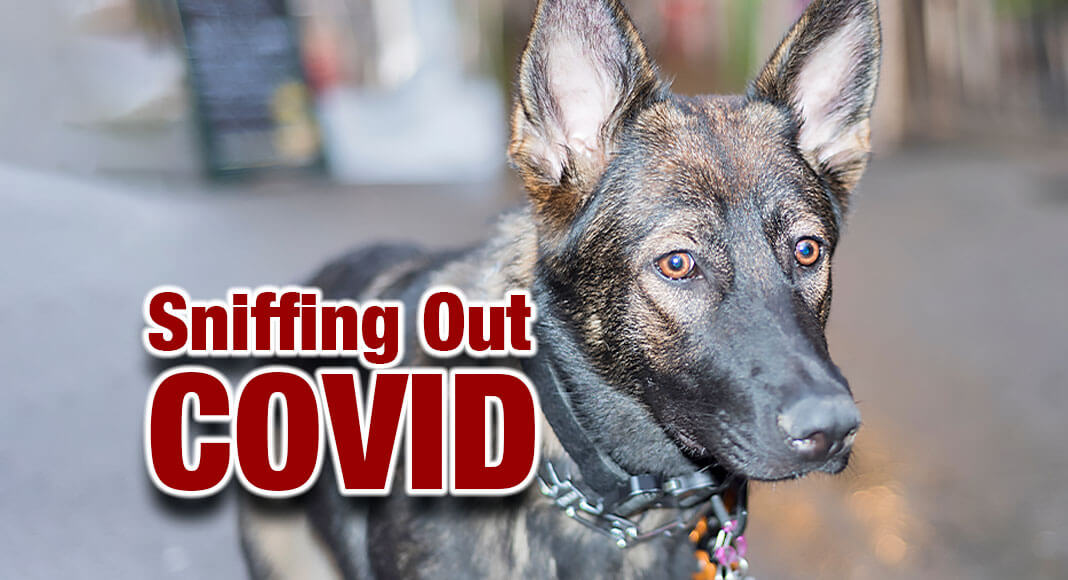
Mega Doctor News
Newswise — A recent study by the University of Helsinki and Helsinki University Hospital confirmed that scent detection dogs can be taught to identify individuals with a coronavirus infection from skin swabs. In the experimental set-up at Finland’s Helsinki-Vantaa International Airport , the accuracy of the dogs in identifying the samples was 92 percent.
The rapid and accurate identification and isolation of patients with coronavirus infection is an important part of global pandemic management. The current diagnosis of coronavirus infection is based on a PCR test that accurately and sensitively identifies coronavirus from other pathogens. However, PCR tests are ill-suited for screening large masses of people because of, among other things, their slow results and high cost.
Researchers from the Faculties of Veterinary Medicine and Medicine at the University of Helsinki and from Helsinki University Hospital jointly designed a triple-blind, randomized, controlled study set-up to test the accuracy of trained scent detection dogs where none of the trio – dog, dog handler or researcher – knew which of the sniffed skin swab samples were positive and which negative. The study also analysed factors potentially interfering with the ability of the dogs to recognize a positive sample.
The three-faceted study has now been published in the journal BMJ Global Health. The study provides valuable information on the use of scent dogs in pandemic control.
Correct identification in over 90 percent of samples; only small differences in accuracy between dogs
In the first phase of the study, the dogs were taught to discriminate the skin swab samples of coronavirus patients from those of volunteers who tested negative. After a training period of several weeks, the dogs moved from the training centre to Helsinki-Vantaa Airport for the next stages of the study.
In the second phase of the study, four trained dogs completed a validation test to prove their discriminatory ability. During the experiment, each dog was presented with a series of 420 samples over a period of seven days. As several parallel samples had been collected from each sample donor, each dog received an identical set of 114 coronavirus patient samples and 306 control samples for sniffing. The coronavirus status of all sample donors had been confirmed by PCR. During each testing day, the dog sniffed 20 sample tracks with three samples each, with the tracks presented in random order.
The dogs recognized the samples correctly 92 percent of the time. While their sensitivity to detect a positive coronavirus sample was 92 percent, their specificity was 91 percent. Only small differences in accuracy were observed between the four dogs. The coronavirus infection being caused by virus variants was the single largest factor contributing to erroneous identification by the dogs.
The study confirms previous reports suggesting that scent dogs can identify individuals with a coronavirus infection.
“Our study set-up was of a high scientific standard. The sample sizes were sufficiently large, and all dogs sniffed an identical set of samples, allowing comparison of their performances. The dogs also had to successfully indicate sample sets containing only negative samples – an important trait when screening individuals. Another significant advantage was that samples were collected from outpatients instead of hospital patients. In addition, the testing was performed under real-life conditions rather than in a laboratory”, says the leader of the DogRisk research group and docent of clinical research in companion animals Anna Hielm-Björkman from the University of Helsinki.
“I was particularly impressed by the fact that dogs performed worse with samples we had collected from patients suffering from a disease caused by a coronavirus variant. The explanation is simple: the dogs had originally been trained with the initial wild-type virus, and thus they did not always identify the variant samples as positive. This reveals their incredible ability of discrimination”, says Anu Kantele, Professor of Infectious Diseases and Chief Physician at the University of Helsinki and Helsinki University Hospital.
Major help from scent dogs at airports and ports
The third phase of the study was conducted by screening passengers and staff at Helsinki-Vantaa Airport in a real-life situation. The scent dogs correctly identified 98.7 percent of the negative samples. The low number of coronavirus-positive samples in real-life testing prevented a proper assessment of the dogs’ performance with positive samples. However, based on positive ‘work motivation samples’ regularly given to the dogs during this part of the study, the performance on the correctly identified positive samples also was evaluated at 98.7 percent. Work motivation samples are naive samples pre-collected from PCR positive patients, but not previously sniffed by dogs. They are provided to the dogs at regular intervals to maintain their interest in the target odour in situations and environments where the proportion of positive samples is otherwise very low.
“Scent dogs can provide an invaluable tool for limiting viral spread during a pandemic, serving for example at air- and seaports. Such a reliable, cheap approach to rapidly screen a vast number of samples or to identify passing virus carriers from a large crowd is of value particularly when the testing capacity with traditional approaches is insufficient”, says Anu Kantele.
“Our research group will continue to study how scent dogs can best help our society. We hope that this newly published study will help to allocate funds for the development of this new ‘tool’. There are many other diseases where research could benefit from the excellent sense of smell that these dogs possess”, says Hielm-Björkman.
The study was conducted with the support of the Finnish Cultural Foundation, Svenska Kulturfonden i Finland, Academy of Finland, Jane and Aatos Erkko Foundation, Finnish Medical Association, Veterinary Hospital Chain Evidensia, Nose Academy, Finavia, Vantaa city and deputy mayor Timo Aronkytö. The research group of Anna Hielm-Björkman has also been supported by private donations through the coronadog fundraising campaign, organized jointly by the Finnish Kennel Club and the University of Helsinki. The dogs were initially trained at the NGO Wise Nose trainings center.












